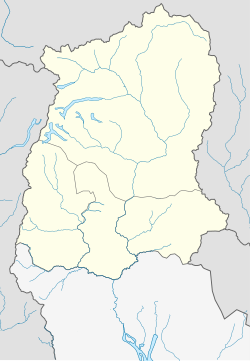Phodong Monastery
Thank you for being part of the Bharatpedia family! 0% transparency: ₹0 raised out of ₹100,000 (0 supporter) |
| Phodong Monastery | |
|---|---|
| Religion | |
| Affiliation | Tibetan Buddhism |
| Sect | Kagyupa |
| Festivals | Chaam Dance (28 and 29th of the 10th month) |
| Location | |
| Location | Sikkim, India |
| Geographic coordinates | 27°24′46″N 88°35′02″E / 27.41278°N 88.58389°ECoordinates: 27°24′46″N 88°35′02″E / 27.41278°N 88.58389°E |
| Architecture | |
| Style | Current building early 18th century |
| Founder | Chogyal Gyurmed Namgyal |
Phodong Monastery (or Phodang) is a Buddhist monastery in Sikkim, India. It is located 28 kilometres from Gangtok.[1] It was built in the early 18th century but an older monastery had pre-existed the current one.[1]
9th Karmapa was invited by the king of Sikkim, where he founded three monasteries : Rumtek, one of the most important monastery of the Karma Kagyu school of Tibetan Buddhism, Phodong and Ralang Monastery.[2]
It was reconstructed by Sidkeong Tulku Namgyal,[3] who was recognized as the reincarnation of his uncle, Sidkeong Namgyal, the abbot of the monastery.[4] The line was to be continued by Palden Thondup Namgyal
The monastery has a residence of approximately 260 monks and has a numerous collection of some ancient murals.[1]
References
- ↑ 1.0 1.1 1.2 "Phodang Monastery". Buddhist-temples.com. Retrieved 21 November 2009.
- ↑ 9th Karmapa Wangchuk Dorje (1556 - 1603)
- ↑ Kuldip Singh Gulia, Mountains of the God
- ↑ Mahendra P. Lama, Sikkim: society, polity, economy, environment
External links


